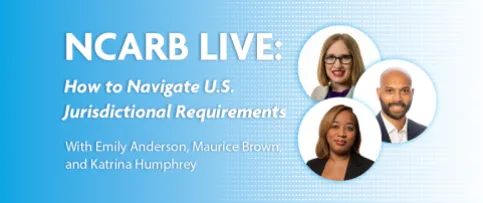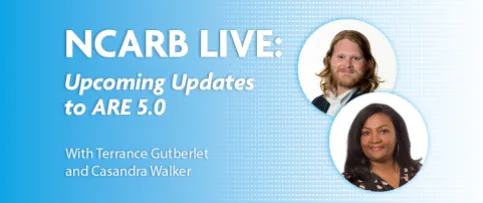Many of you are anxiously preparing to sit for a division of the Architect Registration Examination® (ARE®) and making sure you’ve got everything covered. Besides going through some study materials and scheduling time off from work, you may also be inclined to discuss the test with your peers. But then you read the news or hear from your coworkers and study partners that NCARB has sanctioned ARE candidates who’ve shared “too much” information on the material covered in the exam.
At this point you’ll probably start asking yourself the following questions: What exactly does this mean? If ARE candidates are expected to notify NCARB when someone reveals exam details, how do I know what to talk about and what to keep to myself? While it is expected that you and your colleagues share preparation methods and tips, it is crucial to understand how much is “too much” when talking about the exam—and we’re here to help with that.
Why Maintaining the ARE’s Security Is Important
The ARE not only ensures the public’s health, safety, and welfare, but also affirms that you and other licensure candidates have the required knowledge and skills to competently practice architecture—that’s a big responsibility. To maintain the exam’s security, all candidates must abide by the ARE Candidate Agreement, which prohibits candidates from attempting to access or distribute exam content before or after taking any ARE division, among other details.
The Do’s
So, if ARE candidates are expected to notify NCARB when someone reveals exam details, what exactly can you talk about? What should you keep to yourself? Simply put, you’re allowed to discuss and/or ask questions about general exam content and policies. In fact, we encourage licensure candidates to gather and share study tips on the ARE 5.0 Community—a platform that can support you as you work to meet your goals.
Keep in mind, any content you share on the Community is subject to the ARE 5.0 Community Guidelines, NCARB’s Terms of Use, and the ARE Candidate Agreement, so be sure to review those before getting started.
Here are some sample questions or comments that are acceptable and not in violation of NCARB’s Candidate Agreement:
- Make sure you study about how weep vents are integrated into different wall assemblies.
- Can someone help clarify the Practice Management objective 1.4 related to the standard of care in a given situation?
- What’s the best strategy for tackling the case study part of a division?
The Don’ts
Now that we’ve discussed acceptable ARE-related questions and comments, let’s dive into what you should avoid talking about. For starters, you shouldn’t discuss specific details on exam questions, such as drag-and-place layouts or details of specific case studies.
Here are some examples of definite violations of NCARB’s Candidate Agreement:
- Describing the wall section seen on an actual exam to someone
- Drawing the wall section (from the exam) where the weep vent should go and sharing that with someone
Just to be on the safe side, we usually recommend using the three-word rule—if you’re sharing three or more words from any question or answer on the exam, you’re most likely in violation of disclosing ARE content.
The Takeaway
Whether you’re sharing ARE tips and comments in person or online, it’s important to always keep conversations at a high level and focused on content areas, rather than specifics. Remember, if you have any concerns about how much is too much, reach out on the ARE 5.0 Community for clarification.
Take advantage of our additional ARE resources and share them with your study partners.



